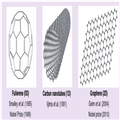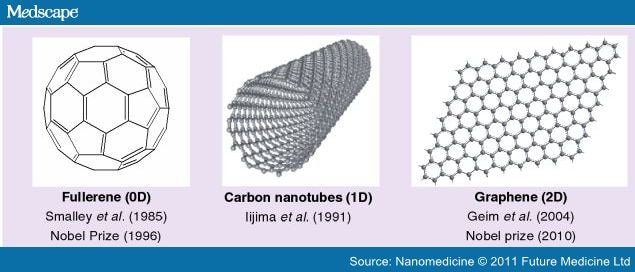Abstract and Introduction
Abstract
Graphene, whose discovery won the 2010 Nobel Prize in physics, has been a shining star in the material science in the past few years. Owing to its interesting electrical, optical, mechanical and chemical properties, graphene has found potential applications in a wide range of areas, including biomedicine. In this article, we will summarize the latest progress of using graphene for various biomedical applications, including drug delivery, cancer therapies and biosensing, and discuss the opportunities and challenges in this emerging field.
Introduction
Sp2-carbon nanomaterials typically include zero-dimensional (0D) fullerene, 1D carbon nanotubes and 2D graphene (Figure 1). Although the discovery of graphene in 2004 quickly spawned a huge field of research, it was not until 2008 that scientists from various groups started paying attention to the potential biomedical applications of graphene.[1–4] Functionalized nano-sized graphene has been used as a drug carrier for in vitro intracellular delivery of anticancer chemotherapy drugs.[2,3,5–7] It has been found that nano-graphene with a biocompatible polyethylene glycol (PEG) coating exhibited high passive in vivo tumor uptake, and could be used for effective photothermal ablation of tumors in a mouse model.[8] On the other hand, many groups have developed graphene-based biosensors to detect various biomolecules via different mechanisms.[4,9–20] Graphene-based nanomedicine, although still in its infancy, appears to be encouraging and may bring novel opportunities for future disease diagnosis and treatment (Table 1).
Figure 1.
Three major types of Sp2-nanocarbons including fullerene, carbon nanotubes and graphene. Scientists who discovered fullerene and graphene won the Nobel prizes in 1996 (Chemistry) and 2010 (Physics), respectively.
For further details see [1,81,82].
Nanomedicine. 2011;6(2):317-324. © 2011 Future Medicine Ltd.
Cite this: Graphene in Biomedicine: Opportunities and Challenges - Medscape - Mar 01, 2011.













Comments